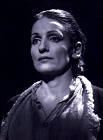ORFEO International
News
August 2009
Hildegard Behrens Obituary
She was at the very top of the wish-list of intendants, conductors, directors and the public at all the big opera houses when it came to high dramatic soprano roles in the 1980s and ’90s. 
Hildegard Behrens
Foto: Sabine ToepfferWhether as Isolde for Leonard Bernstein, Wolfgang Sawallisch or Lorin Maazel in Munich, as Brünnhilde for Georg Solti at the Bayreuth Festival, James Levine at the New York Met or Christoph von Dohnányi at the Vienna State Opera – Hildegard Behrens was celebrated everywhere for her powerful, luminous voice and her dramatic charisma, both of which she knew how to unite thanks to her intelligence and her great characterization skills. She had her breakthrough in the 1970s with two of the trickiest roles in the dramatic repertoire. As Salome under Herbert von Karajan, she for once resolved the paradox inherent in Richard Strauss’s declaration that his character must be a “16-year-old princess with the voice of an Isolde”. But within three years, her artistic visiting-card was established as Leonore in Beethoven’s Fidelio: under Sir Reginald Goodall in London, Karl Böhm in New York and again under Böhm in Munich in 1978 – this last being documented live on the ORFEO label. In this role, she was able to use all her gifts to the full: precision and spiritedness, both in her voice and her acting (even when merely speaking her text!), plus her dazzling appearance and her clearly focussed, warm timbre that culminated in a triumphant top register. Her professionalism and her technical ability allowed Hildegard Behrens to retain these fundamental qualities for a good quarter of a century. She was also much loved among her colleagues and was showered with honours. All her qualities were to be heard and seen in exemplary fashion in the role of “R” that was written for her by Luciano Berio in his Cronaca del Luogo, of which the world première took place at the Salzburg Festival in 1999 under Sylvain Cambreling. Her duets with the figure of Orvid were worthy of comparison with her great moments in musical dialogue with Florestan, Tristan, Wotan or Siegfried. Equally unforgettable was her arioso monologue at the close, which brought to mind how she left her mark on the final scenes of operas by Wagner and Strauss. The opera world is in mourning for the loss of this great artist, who died unexpectedly in Japan on 18 August 2009.
top |